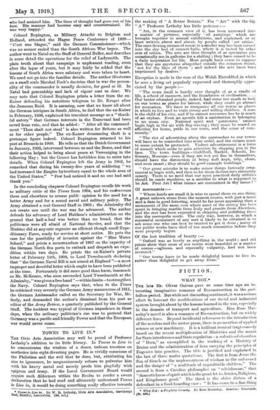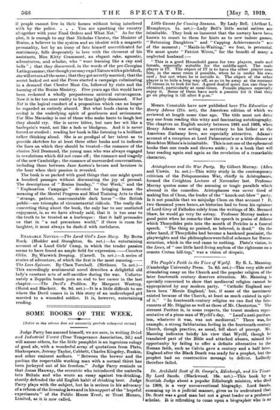FIOTION.
WHAT NOT.*
Tics late Mr. Oliver Onions gave tm some time ago an in- teresting imaginative romance of Reconstruction in the post- helium period. But while not discarding sentiment, it was a seriou s effort to forecast the modifications of our *Social and industrial system brought about by the lessons learned in the war, especially in the domain of transport and agriculture. bliss Rose Mac- aulay's novel is also a romance of Reconstruction, but on widely different lines. Beyond incidental references to the introduction of the aerobun and the motor-pram, there is no mention of applied science or new machinery. It is a brilliant ironical tmgi-comedy based on the recent multiplication of Ministries and the mania for State interference and State regulation—a reductioadubsurdum of " Dora," as exemplified in the working of a Ministry of Brains and the administration of laws carrying the principles of Eugenics into practice. The title is justified and explained in the last of three motto quotations. The first is from Jesus the Son of Sirach on the unpleasantness of wisdom to the unlearned and the danger of " a multitude of unprofitable children." The second is from a Caroline philosopher on " selvishnesse," that "domesticknese of spirit which is the great let to Armies, Religions, and Kingdomes good." The third is the obiler dictum of a defendant in a food-hoarding case " It has come to a fine thing • What Not; a Prophetic Comedy. By Mow Macaulay. London: Constable. ;Oa nett.] if people cannot live in their homes without being interfered with by the police. . . . You are upsetting the country altogether with your Food Orders and What Not." As for the plot, it is enough to say that Nicholas Chester, the Minister of Brains, a believer in the system and an idealist with a magnetic personality, but by an irony of fate himself uncertificated for matrimony, falls desperately in love with the cleverest of his assistants, Miss Kitty Grammont, an elegant rake, agnostic, adventuress, and scholar, who " wore learning like a cap and bells " ; that they discovered, in the words of the pre-Georgian Latin g ram mer, that though you may expel Nature with a pitchfork, ehe will return all the same; that they got secretly married; that the secret leaked out and the Press started a campaign culminating in a demand that Chester Must Go, followed by riots and the burning of the Brains Ministry. Five years ago this would have been reckoned a wholly preposterous satirical extravaganza. Now it is far too near reality to be thus lightly dismissed. What Not is the logical conduct of a proposition which can no longer be regarded as entirely absurd. But what lends charm to the recital is the underlying spirit of gentleness and seriousness. For Miss Macaulay is one of those who make haste to laugh lest they should cry. She is never bitter, but uses her wit like 'a harlequin's wand, not like a lash or bludgeon. And it is never forced or studied : reading her book is like listening to a brilliant talker thinking aloud. She is so prodigal of her talent as to provide sketches for at least three other books and to indicate the lines on which they should be treated—the romance of the elusive Neil Desmond, the young man who was always engaged in revolutions which did not come off ; the romance and tragedy of the new Cambridge; the romance of unrecorded conversations, including those between Jane Austen 's heroes and heroines in the hour when their passion is revealed.
The book is so packed with good things that one might quote a hundred passages without discounting the joy of perusal. The descriptions of " Brains Sunday," " Our Week," and the " Explanation Campaign " devoted to bringing home the meaning of the Mental Progress and Mind Training Acts to that " strange, patient, unaccountable dark horse "—the British public—are triumphs of circumstantial ridicule. The really dia. concerting thing about the book, the only bar to our unstinted enjoyment, is as we have already said, that it is too near to the truth to be treated as a burlesque : that it half persuades us that in " a sad precarious world," if there is room for laughter, it must always be dashed with ruefulness.



































 Previous page
Previous page